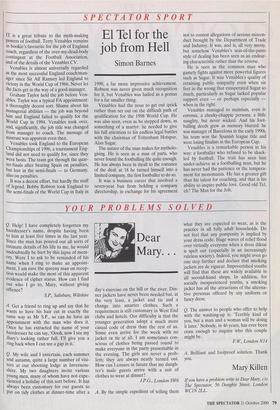SPECTATOR SPORT
El Tel for the job from Hell
Simon Barnes
IT is a great tribute to the myth-making powers of football. Terry Venables remains as bookie's favourite for the job of England coach, regardless of the over-my-dead-body contingent at the Football Association, and of the details of the Venables CV.
Venables is almost universally regarded as the most successful England coach/man- ager since Sir Alf Ramsey led England to victory in the World Cup of 1966. Never let the facts get in the way of a good manager.
Graham Taylor held the job before Ven- ables. Taylor was a typical FA appointment: a thoroughly decent sort. Shame about his managerial abilities — the job was beyond him and England failed to qualify for the World Cup in 1994. Venables took over, and, significantly, the job title was changed from manager to coach. The message of mistrust was apparent even then.
Venables took England to the European Championships of 1996, a tournament Eng- land did not need to qualify for, since they were hosts. The team got through the quar- ter-finals after beating Spain on penalties, but lost in the semi-finals — to Germany, also on penalties.
It was a decent effort, but hardly the stuff of legend. Bobby Robson took England to the semi-finals of the World Cup in Italy in 1990, a far more impressive achievement. Robson was never given much recognition for it, but Venables was hailed as a genius for a far smaller thing.
Venables had the nous to get out quick rather than set out on the difficult path of qualification for the 1998 World Cup. He was also seen, even as he stepped down, as something of a martyr: he needed to give his full attention to his endless legal battles with the chairman of Tottenham Hotspur, Alan Sugar.
The nature of the man makes for mytholo- gising. He is seen as a man of parts, who never found the footballing life quite enough. He has always been in thrall to the romance of the deal: at 18 he turned himself into a limited company, the first footballer to do so.
It was a business career that involved a seven-year ban from holding a company directorship, in exchange for his agreement not to contest allegations of serious miscon- duct brought by the Department of Trade and Industry. It was, and is, all very messy, but somehow Venables's seat-of-the-pants style of dealing has been seen as an endear- ing characteristic rather than the reverse.
He is seen as the common man who gamely fights against more powerful figures such as Sugar. It was Venables's quality of retaining public sympathy even when six feet in the wrong that exasperated Sugar so much, particularly as Sugar lacked popular support even — or perhaps especially when in the right.
Venables managed to maintain, even in extremis, a cheeky-chappie persona: a little naughty, but never wicked. And his foot- balling deeds grew as memory blurred: he was manager of Barcelona in the early 1990s, his team won the Spanish league title and were losing fmalists in the European Cup.
Venables is a remarkable person in his way: a footballer who refused to be shack- led by football. The trait has seen him under-achieve as a footballing man, but he has never had the patience or the tempera- ment for monomania. He has a greater gift than his talent for coaching, and that is his ability to inspire public love. Good old Tel, eh? The Man for the Job.

























































































 Previous page
Previous page